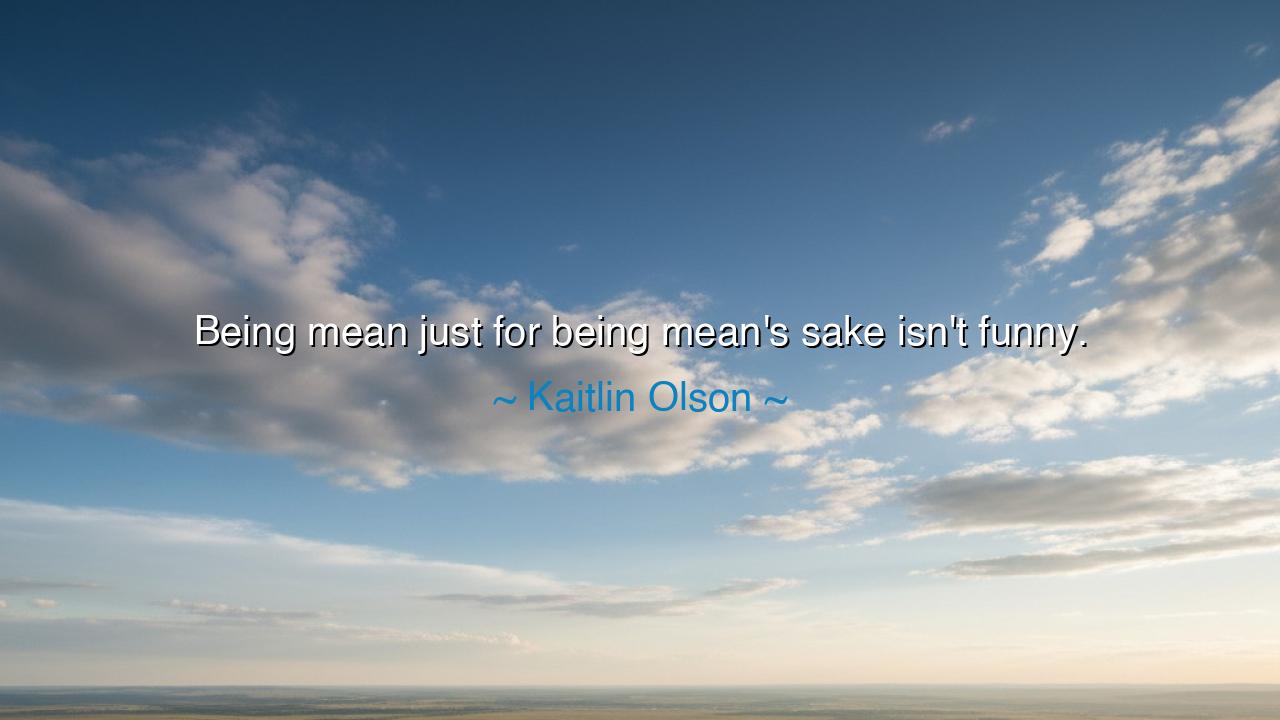
Being mean just for being mean's sake isn't funny.






“Being mean just for being mean’s sake isn’t funny.” – Kaitlin Olson
In this brief but radiant truth, Kaitlin Olson speaks not only as a comedian, but as a guardian of the sacred art of laughter. Her words remind us that humor is not cruelty—it is light, and light must never be born from darkness alone. To be mean for meanness’ sake, as she says, is to wound without wisdom, to strike without purpose. True humor does not humiliate; it illuminates. It shows us the absurdity of life and of ourselves, not to destroy dignity, but to restore it through recognition and shared humanity.
Comedy, in its highest form, has always been a mirror for the human condition. The ancient jesters and playwrights—from Aristophanes to Shakespeare—understood that laughter is a tool of revelation. They mocked kings and fools alike, but always with meaning. The joke was never meant to poison; it was meant to awaken. When humor descends into meanness, it loses its divine spark and becomes nothing more than noise. The cruel laugh fades quickly, but the true laugh, the one born from understanding, echoes through generations.
Consider the wisdom of Charlie Chaplin, whose silent films made the world laugh even through its darkest hours. His humor was never cruel, though it often exposed the cruelty of others. In The Tramp, we see a poor man mocked, beaten, and cast aside—and yet, he smiles. Chaplin did not mock the weak; he lifted them. His comedy struck at oppression and pride, not at the innocent. It was laughter born of empathy, and that is why it endures. He knew, as Kaitlin Olson reminds us, that funny without heart is hollow, and cruelty without purpose is death to the soul of art.
The ancients would have called meanness for its own sake a corruption of logos—the divine order of truth and meaning. Even Aristotle, when writing on the art of comedy, warned that laughter must arise from the recognition of folly, not from the suffering of the undeserving. The great philosophers taught that humor should be guided by virtue: that it must serve harmony, not chaos; compassion, not contempt. When laughter becomes a weapon, it loses its grace. The wise know that one may jest sharply, but never soullessly.
And yet, in our time, how often is cruelty mistaken for wit? How often do voices rise to tear down, not to build? In a world so quick to mock, Kaitlin Olson’s words shine like a lantern. She reminds us that kindness is not the enemy of comedy—it is its foundation. To make others laugh without wounding them is an act of mastery; to do so while inspiring thought and connection is the mark of genius. The fool who chooses meanness gains only momentary attention; the true comedian earns immortality through grace.
There is power in laughter—but with power comes responsibility. The one who commands laughter commands hearts. To misuse that gift is to sow bitterness where joy should bloom. Thus, let every artist, speaker, and soul who seeks to be “funny” remember this sacred truth: that laughter must uplift even as it humbles. The best humor holds a mirror to our flaws, yet offers us forgiveness as we see them. It teaches us to laugh at ourselves, not at others’ pain.
So, children of the stage and spirit, heed the wisdom of Kaitlin Olson: “Being mean just for being mean’s sake isn’t funny.” Let your humor carry warmth, even when it bites. Let your wit be the flame that reveals truth, not the fire that consumes. For cruelty is easy—but kindness, when it dances with intelligence and courage, becomes divine. Be the kind of person whose laughter heals, whose jokes bring light, and whose words remind the world that joy is strongest when shared. For the heart that laughs without malice is the heart closest to heaven.






AAdministratorAdministrator
Welcome, honored guests. Please leave a comment, we will respond soon